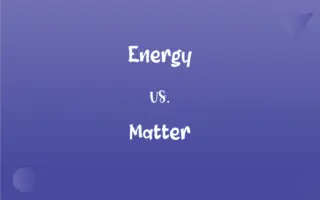Lexicon vs. Vocabulary: What's the Difference?
Edited by Aimie Carlson || By Harlon Moss || Updated on October 18, 2023
Lexicon refers to the entire set of words in a language or a person's personal word bank, while vocabulary is the range of words known or used by an individual.
Key Differences
Lexicon, in linguistic terms, refers to the complete set of words within a particular language or subject area. This comprehensive collection could be in a dictionary or among speakers of a language. Conversely, vocabulary pertains more to the collection of words that an individual knows or uses. In a broad sense, vocabulary is a subset of a lexicon, tailored to an individual's knowledge or use.
Lexicon can also signify the mental storehouse of linguistic information about words. This includes not only their meanings but their sound and structural properties. Vocabulary, on the other hand, often suggests an active knowledge of words. When we say someone has a "large vocabulary," we're commenting on the breadth of words they actively use or understand.
In specialized fields, a lexicon might refer to a set of terms pertinent to that field. For example, the lexicon of a lawyer might differ significantly from that of a musician. Vocabulary's focus remains on personal knowledge, so a scientist might have a vast vocabulary of scientific terms, but those words are still part of the broader scientific lexicon.
At times, lexicon and vocabulary can be used interchangeably, especially in casual discourse. However, in a more technical linguistic setting, their distinctions are more pronounced. The lexicon stands as a broader term, encompassing all words in a language or domain, while vocabulary zeroes in on individual knowledge and use.
Comparison Chart
Definition
Entire set of words in a language or domain.
Range of words known or used by an individual.
ADVERTISEMENT
Scope
Broader, encompassing all words.
Narrower, focused on individual use.
Usage
Often used in linguistic or specialized contexts.
Commonly referenced in education and daily life.
Variability
Static for a language at a given time.
Dynamic, can grow or reduce with learning.
Example
Dictionary, specialized terms in a field.
Words a student learns for a test, personal word bank.
Lexicon and Vocabulary Definitions
Lexicon
The complete set of words in a language.
The English lexicon is vast and ever-evolving.
ADVERTISEMENT
Vocabulary
The body of words known to an individual person.
Reading often expands one's vocabulary.
Lexicon
A dictionary, especially of Greek, Hebrew, Syriac, or Arabic.
The scholar consulted a lexicon to understand the ancient text.
Vocabulary
The stock of words used by or known to a particular people or group of persons.
Their native vocabulary is extensive, but they also know English well.
Lexicon
The structure of the vocabulary of a language as understood by a particular school of linguistics.
Chomskyan linguistics offers a distinct perspective on the lexicon.
Vocabulary
A list or collection of words or of words and phrases.
The vocabulary list for the test includes 50 terms.
Lexicon
A list of terms relating to a specific subject.
The book included a lexicon of culinary terms.
Vocabulary
The range of artistic or stylistic forms, techniques, or movements.
The artist's vocabulary includes various mediums and styles.
Lexicon
The vocabulary of a person, language, or branch of knowledge.
The lexicon of medical terms is extensive.
Vocabulary
Words of a particular field or discipline.
Legal documents often have a specialized vocabulary.
Lexicon
A dictionary.
Vocabulary
All the words of a language.
Lexicon
A stock of terms used in a particular profession, subject, or style; a vocabulary
The lexicon of surrealist art.
Vocabulary
The sum of words used by, understood by, or at the command of a particular person or group.
FAQs
Are lexicon and vocabulary interchangeable?
Not always. While both relate to words, "lexicon" often denotes a more comprehensive or specific collection, while "vocabulary" often pertains to an individual's knowledge or a specific topic.
How can one expand their vocabulary?
By reading widely, engaging in varied conversations, learning a new language, using vocabulary apps, and regularly practicing writing.
What is a lexicon?
A lexicon is the complete set of words in a language or a specific collection of terms used within a particular field of study or profession.
Where does the term "lexicon" originate?
It originates from the Greek word "lexikón," which means "of or for words."
Can a lexicon be specialized?
Yes, specialized lexicons exist for various fields, such as linguistics, medicine, law, or computer science.
What role does culture play in shaping a lexicon?
Culture influences which concepts are important enough to have words, how these concepts are categorized, and the evolution of words over time.
Can animals have a vocabulary?
In a way, yes. Some animals, especially those trained by humans, can recognize and respond to a set of specific sounds or signs, which can be termed their "vocabulary."
What is vocabulary?
Vocabulary refers to all the words known and used by a particular person or a set of words relevant to a particular subject.
How does a person's vocabulary grow?
Through reading, listening, speaking, studying, and experiencing new things.
How is a dictionary different from a lexicon?
A dictionary provides definitions, pronunciations, and often usage examples for words, while a lexicon is typically a list or collection of words without detailed definitions.
How are vocabulary size and intelligence related?
A larger vocabulary can be an indicator of exposure to diverse contexts and learning, but it isn't a direct measure of intelligence.
What is a lexeme?
A lexeme is a unit of lexical meaning, which exists regardless of any inflectional endings it may have or the number of words it may contain.
What does it mean by a word's lexical meaning?
It refers to the inherent, dictionary-defined meaning of a word, separate from any contextual or associated meanings.
What's a controlled vocabulary?
It's a predefined list of terms used to describe a particular type of information, often used in libraries and databases.
What's the relationship between grammar and lexicon?
Grammar provides the structure and rules for combining words, while the lexicon provides the words themselves.
What is a lexical item?
A lexical item is a single word, part of a word, or a chain of words that functions as a single unit in the syntax and vocabulary of a language.
What's the difference between active and passive vocabulary?
Active vocabulary consists of words we regularly use and are comfortable with, while passive vocabulary includes words we recognize but don't typically use.
What is a learner's vocabulary?
It's the set of words a student is familiar with at any point in their language learning journey.
Can a single word belong to both a person's active and passive vocabulary?
Typically, no. If a person uses it regularly, it's active. If they recognize but don't use it, it's passive.
Are idioms part of a person's vocabulary?
Yes, idioms are expressions whose meaning can't be deduced from the meanings of individual words, and they're part of one's vocabulary.
About Author
Written by
Harlon MossHarlon is a seasoned quality moderator and accomplished content writer for Difference Wiki. An alumnus of the prestigious University of California, he earned his degree in Computer Science. Leveraging his academic background, Harlon brings a meticulous and informed perspective to his work, ensuring content accuracy and excellence.
Edited by
Aimie CarlsonAimie Carlson, holding a master's degree in English literature, is a fervent English language enthusiast. She lends her writing talents to Difference Wiki, a prominent website that specializes in comparisons, offering readers insightful analyses that both captivate and inform.































































